
THREAD: us credit downgrade ignites panic
LifeLine™ Media threads use our sophisticated algorithms to construct a thread around any topic you want, providing you with a detailed timeline, analysis, and related articles.
News Timeline


SHOCKING CYBERATTACK Paralyzes US Infrastructure, Ignites Fears Of Chaos
— A massive cyberattack has slammed vital infrastructure across the United States. Power, transportation, and banking systems are facing major outages in several regions. Federal agencies are rushing to stop the breach and bring back essential services.
Officials believe a foreign government is likely behind this attack. The Department of Energy has long warned about weak spots in our power grid, and now emergency plans are rolling out nationwide.
The President has been briefed on the situation. National security teams are now considering how to respond. There’s real worry that banks may have been hit too, raising fears about what could happen to our economy.
This could be one of the biggest cyberattacks America has ever seen. Investigators are working fast, but many questions remain as new details come in.

GLOBAL MARKET Panic: US Sanctions on China Trigger Shockwaves
— Stock markets around the world took a nosedive after the US slapped new sanctions on China’s tech industry. The Biden administration claims China has been stealing American ideas and playing unfair in trade.
Some experts warn these tough measures could start a bigger trade war, hurting supply chains and slowing down the world economy. Asian markets, especially in Japan and South Korea, dropped fast as worries spread about what comes next.
Investors are being told to pay close attention as leaders rush to emergency meetings to figure out their next move. This story is still unfolding and could hit businesses everywhere hard.

US CREDIT DOWNGRADE Ignites Panic and Reckoning on Debt
— America just lost its “perfect” credit rating, and the fallout is hitting hard. Investors are rushing to gold, worried that markets could get even more unstable.
Experts warn that higher borrowing costs for the government could soon hurt families and small businesses. The downgrade is sparking fresh arguments over how Washington handles spending and debt.
This blow comes as Congress keeps fighting over how to manage the nation’s finances. Fixing the economy now looks even tougher with so much uncertainty in Washington.
RECORD TRADE Deficit Ignites Alarm Over Weak US-China Deal
— America’s trade deficit has hit a record $1.2 trillion, sparking fresh fears about the country’s financial health. Treasury Secretary Scott Bessent claimed “substantial progress” in talks with China but failed to share any real details about the agreement made in Geneva.
The U.S. wants China to change its economic habits and shrink the $295 billion gap between the two nations. Many hoped this deal would lower tensions, but doubts are growing because no one knows what was actually agreed on.
Republicans are demanding answers and real results, warning that out-of-control deficits put American jobs and factories at risk. The Biden administration now faces heavy pressure to deliver actual solutions instead of empty promises.
Until Washington releases clear terms, Americans have every right to question if their leaders are truly fighting for U.S. interests in these critical talks with China.
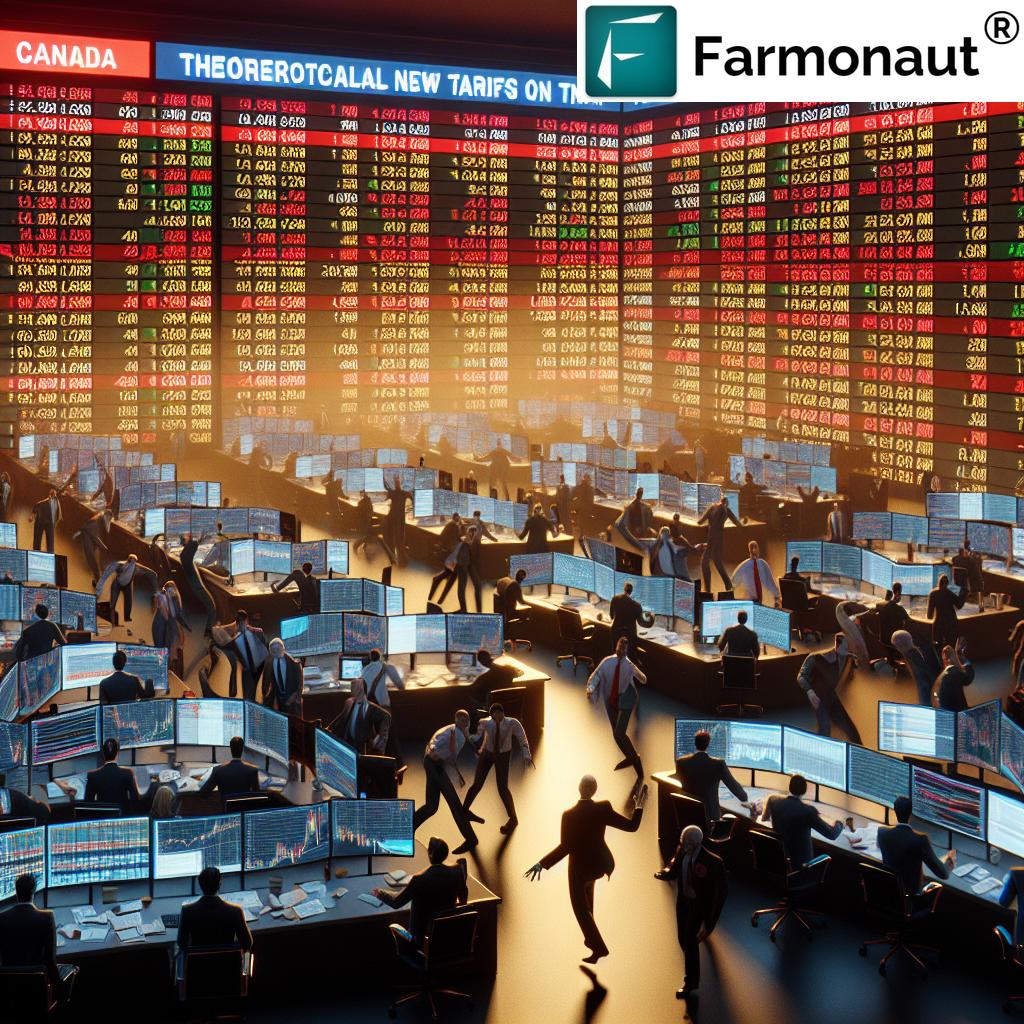
FED’S Bold Move Stuns Wall Street: Trump’S Trade Fight Ignites Fear And Hope
— Wall Street took a wild ride after the FEDERAL RESERVE made its latest move and President Trump doubled down on tariffs. Investors were left uneasy. Goldman Sachs warned the S&P 500 could drop even more if trade fights get worse. UBS also lowered its forecast, showing growing worry about where things are headed.
The S&P 500’s longest winning streak in twenty years came to an end as traders feared new tariffs could hurt economic growth and profits. Some industries, like media and film, are especially nervous about possible tariffs on foreign movies, which has sparked debate over American jobs and creative freedom.
Treasury Secretary Scott Bessent tried to calm everyone down by saying Trump’s policies — tariffs, tax cuts, and cutting red tape — are meant to help America in the long run, even if things feel shaky now. The White House says these steps will make U.S. businesses stronger against unfair competition from other countries.
As markets react to these changes, people are split on whether tough trade rules will help or hurt in the end. Many conservatives believe Trump is finally standing up for American workers who have been ignored for too long by global deals that put them last.;
GOLDMAN SACHS Sounds Alarm: S&P 500 Faces Shock From Trump-ERA Trade Fight
— Goldman Sachs is warning that the recent jump in the S&P 500 may not last. The bank says new trade tensions under President Trump and signs of a weaker economy are big risks for investors.
Trump’s “Liberation Day” announcement has stirred up talk about more U.S.-China tariffs. Goldman Sachs questions if the market can keep rising if these trade fights heat up again.
TD Cowen now says there’s a 70% chance that Chinese stocks could be kicked off U.S. exchanges, thanks to ongoing pressure from Trump’s team. This adds even more worry for investors as trade rules keep changing fast.
These warnings show how quickly things can shift on Wall Street when leaders make bold moves and economic data sends mixed signals. Investors are watching closely to see if tariffs will cause real trouble — or if relief is on the way soon.
US MARKETS SHAKEN: GDP Slump and Trump’S Tough Trade Moves Rattle Investors
— Wall Street had a rocky day. The Dow Jones rose by 141 points, but the S&P 500 and Nasdaq barely moved. New data showed the US economy shrank for the first time in three years, and job growth was weaker than hoped. Many investors are watching President Trump’s trade tariffs as inflation reports come out and tech stocks struggle.
Visa stood strong with big profits and a $30 billion stock buyback plan. CEO Ryan McInerney said Visa’s business model is helping them stay steady in these tough times. But airlines and auto parts companies are still feeling the pain from tariffs.
Outside the US, Pakistan’s stock market crashed over fears of military conflict with India, which also hurt Indian markets. In Europe, the central bank raised interest rates even though banks are still shaky after problems at Credit Suisse.
Tech firms like Super Micro Computer reported less demand for AI equipment, while BlackRock invested more in blockchain technology. Experts say investors should be careful with risky stocks right now and look at safer options as global uncertainty grows.
TRUMP’S Auto Import Tarifs Spark Fears And Rattle Markets
— Swiss bank UBS has cut its S&P 500 forecast for the end of 2025 from 6,600 to 6,400 points. This comes after President Trump announced new 25% tariffs on imported cars. Many worry these tariffs could start a bigger global trade fight. Still, UBS’s Mark Haefele says there is “meaningful upside” for U.S. stocks this year.
The new tariffs have shaken investors in the U.S., Asia-Pacific, and Europe. President Trump stands firm on his decision. He said he “couldn’t care less” if automakers raise prices and believes Americans will buy more cars made at home.
Markets worldwide are reacting fast to the news. The MSCI world stock index fell by 4.5% in March — the worst drop since September 2022. JPMorgan’s Bruce Kasman now says there is a 40% chance of a recession.
Investors face more risk as these bold trade moves take effect under Trump’s America-first plan. Wall Street is watching closely to see how this will impact jobs and growth in the months ahead.
TRUMP’S Trade WAR: A Global Financial Nightmare?
— The Bank of England warns of a looming global financial crisis due to Donald Trump’s trade war. The Financial Policy Committee (FPC) pointed out risks from new global tariffs introduced on April 9. These tariffs have increased uncertainty in world markets, possibly leading to debt spirals for governments.
The UK, with its open economy and large financial sector, is especially vulnerable to shocks from international trade conflicts. Rachel Reeves, the Chancellor, confirmed ongoing talks with the Bank’s Governor to watch market developments amid these tensions.
Trump’s threats of more tariffs on China could escalate the conflict and harm international cooperation. Such actions may worsen financial conditions worldwide, according to the FPC’s warning note.
Despite these worries, analysts believe that the well-capitalized UK banking system might offer some protection against economic turmoil. However, watching trade war developments remains crucial as they could greatly impact both local and global markets.
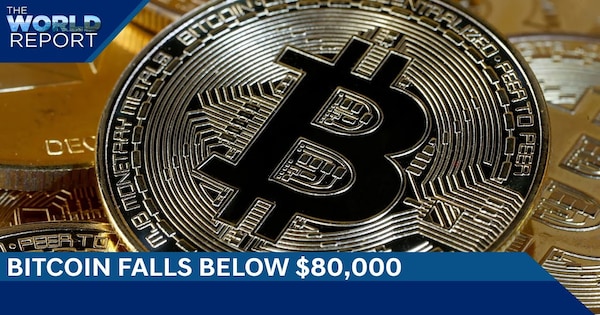
MARKET PANIC: Bitcoin and Stocks Plummet in US Tariff Chaos
— Bitcoin dropped below $80,000 on Sunday, falling over 3% in just two hours. This decline happened alongside major losses in U.S. stock markets. The S&P 500 and Nasdaq Composite both closed nearly 6% lower on April 4. Analyst Holger Zschaepitz noted the stock market lost $8.2 trillion, surpassing losses from the worst week of the 2008 financial crisis.
The market chaos comes from recent U.S. tariffs that have sparked widespread sell-offs across many sectors. Despite this turmoil, some investors see potential buying opportunities as stocks are now trading at historically low valuations of 15 times future earnings projections.
Jim Cramer has warned this could be just the start of a bigger downturn for the S&P 500, predicting a further meltdown of up to 20%. As of Sunday night, S&P futures were down about 4%. Global stocks have already lost $7.46 trillion since April 2nd and may exceed $10 trillion if recent sell-offs continue to unfold.;

TRUMP’S Trade Policy Shocks: US Stocks Plunge in Market Chaos
— The EURO has surged to a six-month high as investors react to the latest U.S. tariff announcements. Meanwhile, the Australian dollar has taken a hit, reflecting global market volatility. These currency shifts highlight ongoing economic uncertainties fueled by international trade tensions.
U.S. stock futures have plummeted after China’s retaliatory tariffs on American goods, marking another phase in the global trade conflict. The Dow Jones dropped 1,679 points, causing widespread concern among investors and financial strategists who urge calm and strategic planning during these turbulent times.
Bitcoin ETFs saw nearly $100 million in net outflows as markets reacted sharply to tariff news from the Trump administration. This exodus underscores investor anxiety and uncertainty about future economic conditions amid escalating trade disputes with China.
Goldman Sachs has revised its oil price forecasts downward due to fears of a potential recession and increased supply from OPEC+. Gold prices have steadied after an initial selloff triggered by aggressive U.S. tariff policies, indicating cautious optimism among investors seeking safe-haven assets in uncertain times.
TRUMP’S 10% Tarifts Spark Stock Market Chaos
— U.S. stocks plunged after President Trump announced a 10% tariff on all trading partners. The Dow dropped about 1,300 points, with the S&P 500 and Nasdaq also taking hits. Investors quickly reacted, showing concern over potential economic fallout.
President Trump plans to impose reciprocal tariffs starting at 10%, targeting countries worldwide and adding extra duties for “worst offenders.” This move has unsettled markets and might lead to higher consumer costs and a possible recession. Economists are worried about the long-term effects on both domestic and global economies.
Globally, the response has been mostly negative, with many countries considering countermeasures to protect their economies from these new tariffs. This rise in trade tensions marks a significant shift in international economic relations under Trump’s leadership. Key sectors relying on international trade may face challenges as relationships with major trading partners change.

STOCK MARKET Chaos: US Faces Economic Fears as Tariffs Loom
— U.S. stocks took a nosedive today as President Donald Trump’s “Liberation Day” approaches, bringing potential tariffs on Canadian steel and aluminum imports. Analysts warn these tariffs could trigger a market downturn and increase recession risks. Wolfe Research has already revised U.S. growth estimates for 2025 down to 1.6%.
Retail giant Kohl’s experienced its worst trading day since 1992, with stocks tumbling by 26% after issuing disappointing guidance for the year. Investor anxiety is also heightened by an upcoming House vote on a stopgap funding bill, adding to market volatility.
The Dow Jones Industrial Average has fallen 8.3% from its peak, raising concerns about the tech sector’s performance compared to the S&P 500. Investors are bracing for further shifts as policy decisions unfold in the coming days amid fears of reduced earnings across sectors due to new tariffs and declining consumer confidence.

TRUMP’S Bold Move: How NEW Tariffs Rattle the Stock Market
— U.S. stocks fell sharply as President Donald Trump’s tariffs on Canada and Mexico took effect, sparking economic fears. Investors worry about the potential impact amid existing uncertainties. Analysts warn of a possible recession, urging caution in market activities.
The S&P 500 and Nasdaq composite saw major drops, hitting technology stocks hard. Companies across sectors are revising forecasts due to these new trade policies. Experts suggest these tariffs could worsen inflation and reduce consumer spending soon.
These tariffs are part of Trump’s broader trade agenda to boost U.S. manufacturing but risk retaliatory actions that may harm American businesses and consumers. The market remains bearish as analysts closely watch for policy fallout effects.

GOLD Prices PLUMMET Amid Trade WAR Jitters
— Gold prices took a big hit on Tuesday as traders cashed in profits with US Treasury bond yields falling. The XAU/USD pair saw a noticeable drop during the North American session. President Trump’s tariff threats against Mexico and Canada added to market uncertainty, affecting investor choices.
The decline in gold prices marks a change from the previous session’s record highs, driven by fears about Trump’s trade policies. Investors are reacting to possible instability in global markets, leading them to take profits.
This market shift highlights ongoing worries about economic stability and trade relations under the current administration. As traders adjust their positions, gold’s recent rally seems to be losing momentum amid these geopolitical tensions.

GOLD PRICES Skyrocket: Trump’s Bold Tariffs Spark Investor Panic
— Gold prices have soared to nearly $2,950 per ounce after President Trump announced new tariffs on steel and aluminum imports. Investors are rushing to gold, seeing it as a safe haven amid fears of a global trade war. This surge shows rising concerns about market instability and potential economic fallout.
The tariffs have caused big swings in both commodities and stock markets, with gold seeing the most dramatic rise. Analysts caution that these actions might lead to retaliation from other countries, making international trade relations even more complex.
Investors are keeping a close eye on U.S.-China trade talks since any changes could affect gold’s future path in the market. The situation is still developing, leaving many worried about the wider effects on global economic stability.

Bank of England’s RATE CUT Sends Shockwaves Through Markets
— The Bank of England has cut interest rates by 25 basis points, causing the Pound Sterling to drop sharply against the US Dollar. This move shows worries about economic growth and inflation. Experts expect more rate cuts in 2025, signaling a careful approach to monetary policy.
Market analysts warn this could affect savings rates and borrowing costs, urging people and businesses to rethink financial plans. The immediate effect saw GBP/USD fall by 0.93%, hitting a session low of 1.2359.
This has increased market volatility, raising concerns about future economic stability in the UK. As uncertainty grows, many wonder how these changes will impact their finances and investments moving forward.

TRUMP’S Trade WAR Ignites Gold Rush And Market Turmoil
— Gold prices have hit a record high as investors flock to safe assets amid President Donald Trump’s new tariffs. These measures target imports from Canada, China, and Mexico, sparking worries about inflation and economic growth. JP Morgan is optimistic about gold, urging investors to buy during this dip.
Wall Street braces for losses due to fears of an escalating trade war from Trump’s tariff actions. The 25% tariffs on Canada and Mexico and 10% on China may cause “short-term” pain for Americans, according to Trump. Global markets watch cautiously as these policies unfold.
Oil prices are climbing in response to the tariffs, while metal and agricultural commodities face pressure downward. The financial landscape is shifting with markets adjusting to a potential prolonged trade conflict led by the U.S., causing the dollar to gain strength amid global trade uncertainty.

GOLD PRICES Soar: Trump’s Trade Moves Spark Investor Panic
— Gold prices soared to a record $2,800 on Friday as investors sought safety amid tariff threats from President Trump. His remarks have sparked concerns about potential economic impacts.
The uncertainty surrounding tariffs has driven demand for gold, a traditional safe-haven asset. Investors fear that any major trade moves could weaken the U.S. dollar, making gold more attractive.
Analysts also note that increased buying by jewelers and retailers ahead of the marriage season contributed to the price surge. These factors combined have led to unprecedented highs in gold prices.
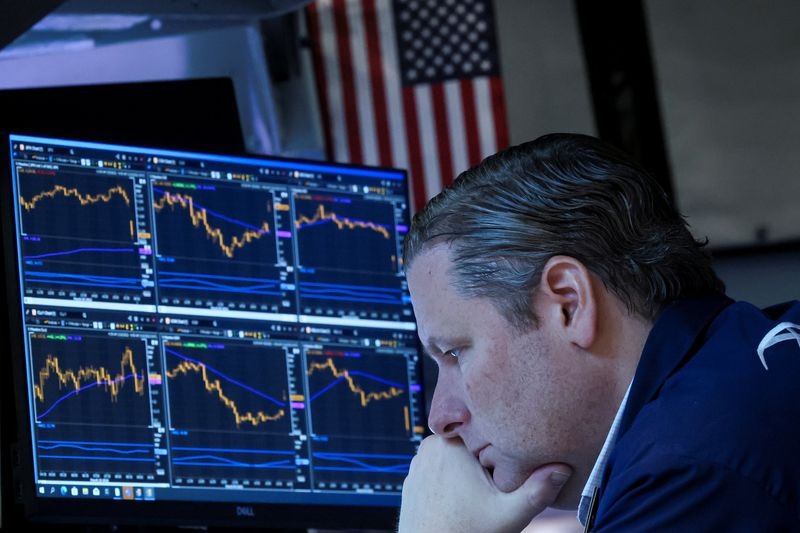
STOCK MARKET Chaos: Inflation Fears Shake Investor Confidence
— The U.S. STOCK market took a big hit today, with major indexes dropping over 3% due to rising inflation fears. Investors worry about possible Federal Reserve policy changes after high inflation numbers came out earlier this week. This is one of the steepest drops in months, shaking confidence that had been boosted by strong job reports.
Bond yields are up, with the 10-year Treasury bond yield hitting about 4.1%, its highest since late 2023, signaling increased inflation expectations. Big tech stocks like Apple and Microsoft saw sell-offs over 5%, adding to the market slump. Analysts warn that ongoing inflation might push the Federal Reserve to rethink interest rate policies, possibly leading to more hikes instead of cuts.
The decline comes after a strong holiday shopping season that initially suggested steady economic growth but is now overshadowed by ongoing inflation problems. Retail and consumer sectors face rising costs and reduced spending, making investors cautious in these areas. Companies like Walmart and Target report higher holiday sales but shrinking profit margins due to inflation pressures, prompting them to rethink annual forecasts.
Banks like JPMorgan are bracing for possible loan defaults as consumers struggle with higher living costs by setting aside more reserves. Market analysts expect continued volatility as investors digest new inflation data and Fed policy implications.;

— Nasdaq Soars 1% as Wall Street Overcomes Russia-Ukraine Concerns The tech-heavy index rallied, buoyed by a significant surge in Nvidia shares despite ongoing geopolitical tensions

— Dow Drops 300 Points as Rate Concerns Weigh on Post-Election Rally The Dow Jones Industrial Average fell 300 points on Friday, stifling momentum from the recent election amid ongoing worries about rising interest rates

— Fed Officials Split on Potential Half-Point Rate Cut in September Minutes reveal a division among Federal Reserve officials regarding a possible half-point interest rate reduction this month

— Fed Officials Split on September Rate Cut Decision Minutes reveal a division among Federal Reserve officials regarding a potential half-point interest rate cut in September

— S&P 500 SOARS to NEW RECORD CLOSE The index surged as traders sought to capitalize on the momentum from recent Federal Reserve interest rate cuts

Video
GLOBAL ELECTIONS Shock: What’s at Stake for Iran, Britain, and France
— Over the next week, voters in countries like Iran, Britain, and France will head to the polls. These elections come at a critical time with global tensions high and public concerns over jobs, climate change, and inflation.
In Iran, Supreme Leader Ayatollah Ali Khamenei seeks a successor for President Ebrahim Raisi following his recent death. Candidates include hard-liners Saeed Jalili and Mohammad Bagher Qalibaf as well as reformist Masoud Pezeshkian.
These elections could significantly impact global politics amid ongoing wars in Europe, the Middle East, and Africa. The outcomes may reorient international relations during this period of mutual suspicion among major powers.


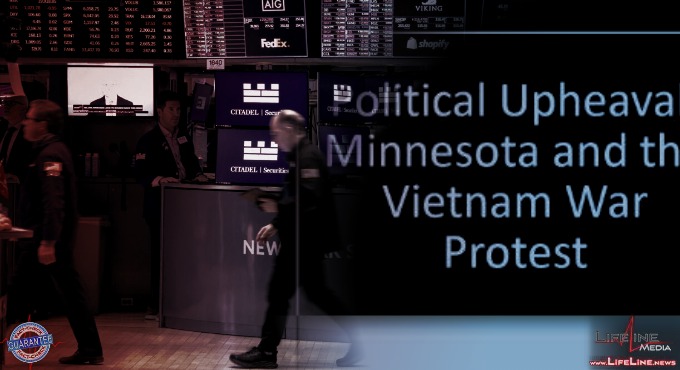
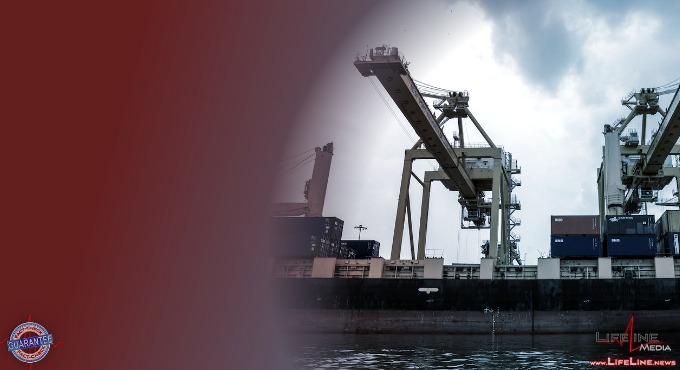
Social Chatter
What the World is SayingThe greatest risks to American exceptionalism are our national debt crisis & our educational achievement crisis. Both were self-inflicted & both are still solvable (for now). But it’s going...
. . .Pres. Trump's administration is set to begin collecting defaulted student loan payments next week — which could harm the credit scores of millions of borrowers. Here’s what to know about...
. . .The interest on the federal debt has escalated dramatically in recent years and will continue to gobble up more and more revenue…
. . .The interest on the federal debt has escalated dramatically in recent years and will continue to gobble up more and more revenue…
. . .The interest on the federal debt has escalated dramatically in recent years and will continue to gobble up more and more revenue…
. . .